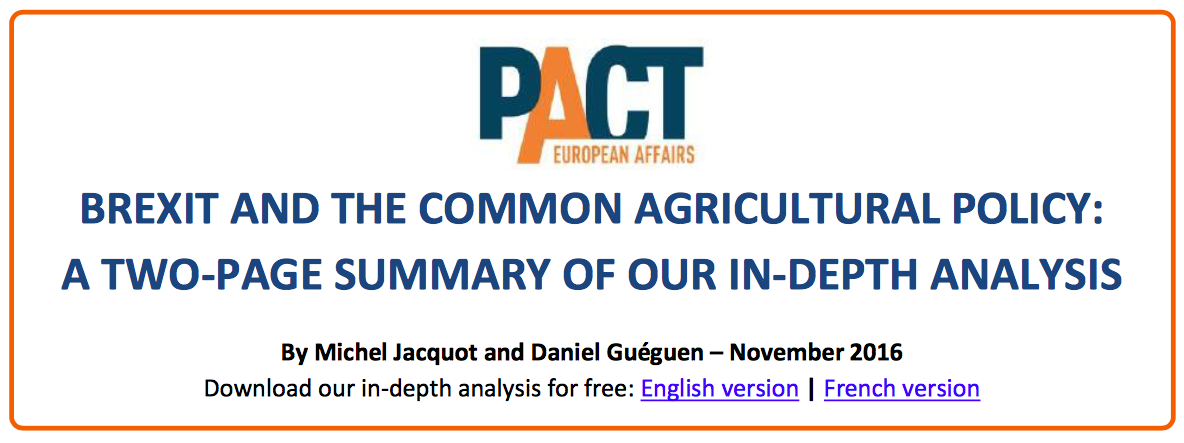A two-page summary of our in-depth analysis Article 50 and its triggering.
The notorious Article 50 (TEU) of the Lisbon Treaty seems clear in its wording. It envisages 3 general steps leading to the UK’s withdrawal from the EU: (1) London’s notification of intent to withdraw; (2) Brussels’ adoption of its negotiating mandate, based on European Council guidelines and the Commission’s proposal to the Council; (3) the launch of negotiations and the ratification of a withdrawal agreement within 2 years.
However, since the British referendum was held on 23 June 2016, the process has frozen because of four main uncertainties:
1. Is London’s notification of intent to withdraw a binding decision, or is it rather a simple statement of intent that can be reversed, as several legal experts believe?
2. In addition to the Article 50 notification, the UK must also propose a ‘divorce agreement’ to the EU27 with concrete details of its vision of Brexit, although London is clearly not ready to do so.
3. A vote by the Westminster Parliament will be required. However, Theresa May’s government does not intend to consult British MPs.
4. How will Scotland, Wales and Northern Ireland be involved in the upcoming negotiations and the final agreement?
All these issues must be clarified before debating the future of EU policies – and more specifically the most integrated of all EU policies: the Common Agricultural Policy.
Taking the United Kingdom out the CAP may appear simple…but it isn’t!
The CAP relies on four basic regulations (1308/2013, 1307/2013, 1306/2013 and 1305/2013). After careful verification, we noted that there is no special derogation for the UK that would oblige the EU to modify the content of these regulations. After Brexit, it will be up to the UK to maintain them in its domestic law or to adopt new laws, and to accept the consequences (i.e. remaining in or leaving the EU market).
Europeans need to pay attention to two issues: external trade and the budget. Depending on London’s intentions, adjustments may be required. This will start with a close examination of secondary legislation (i.e. delegated acts and implementing acts), which account for the major portion of all applicable rules (e.g. import duties of agricultural products, tariff quotas).
The tricky issue of trade agreements
We believe that the EU (i.e. the Commission) should immediately ask the WTO to set up a dedicated group (or ‘panel’) of trade lawyers as an offshoot of the Dispute Settlement Body, with or without the approval of the UK, to assess Brexit’s impact on the EU customs union and its trade agreements (+/- 100) ratified with non-EU countries.
If the UK decides to leave the EU customs union, it will have to comply with international trade law, and in particular Article XXIV paragraph 6 of the GATT (General Agreement on Tariffs and Trade), which stipulates that any re-imposition of protective measures at the border, whether tariff or non-tariff, must give rise to compensation via negotiated concessions. This raises two issues:
1. The UK will have to renegotiate the conditions of its trade relations with the EU: what level of custom protection does it want for each agricultural product imported from the EU? What compensation will it concede in return, in the agricultural sector or any other sector?
2. The EU will have to re-negotiate the conditions of its trade relations with the rest of the world: what will happen to trade concessions granted by Brussels to its trade counterparts at the request of the UK? For instance, the cheddar designation in the EU-Canada agreement (CETA) or milk and beef meet from New Zealand in the EU-New Zealand agreement? It is not in Europeans’ commercial interest to maintain these obsolete trade concessions.
Brexit and the financing of the CAP
The UK’s annual financial contribution to the EU budget represents approximately €11-12 billion, once the special rebate obtained by Mrs Thatcher is paid. Benefiting from around €7 billion in EU funds, of which about €4 billion is devoted to the CAP (EAGGF and EAFRD funds), Her Majesty’s government is therefore a net contributor of €4-5 billion to the annual EU budget.
Thus, Brexit will generate an annual gap of €5 billion that will have to be compensated either by requesting other Member States to increase their contribution, or by reducing EU expenditure. At this time, neither of these options appears politically acceptable.
The agri-food sectors affected by Brexit
Professionals from the agri-food sectors will have to pay great attention to upcoming regulatory changes in the UK. As we already know, the UK has never liked the CAP, and even less the accompanying EU legislative framework covering the agri-food industry. Too protectionist, too much linked to the precautionary principle, the UK may use Brexit as an opportunity to re-write laws at its convenience.
However, far-reaching reforms would de facto exclude the UK from the EU internal market. London should instead attempt a ‘pick-and-choose’ strategy by amending its legislation on a limited number of issues, provided that this does not affect EU internal market laws. However, full access to the EU market will require the UK to agree to free movement of persons. When you take all these factors into account, it seems truly destined for Brexit not to happen.
To speculate on the impact of Brexit and hedge your risk Option.Finance can assist wit your financial options.

